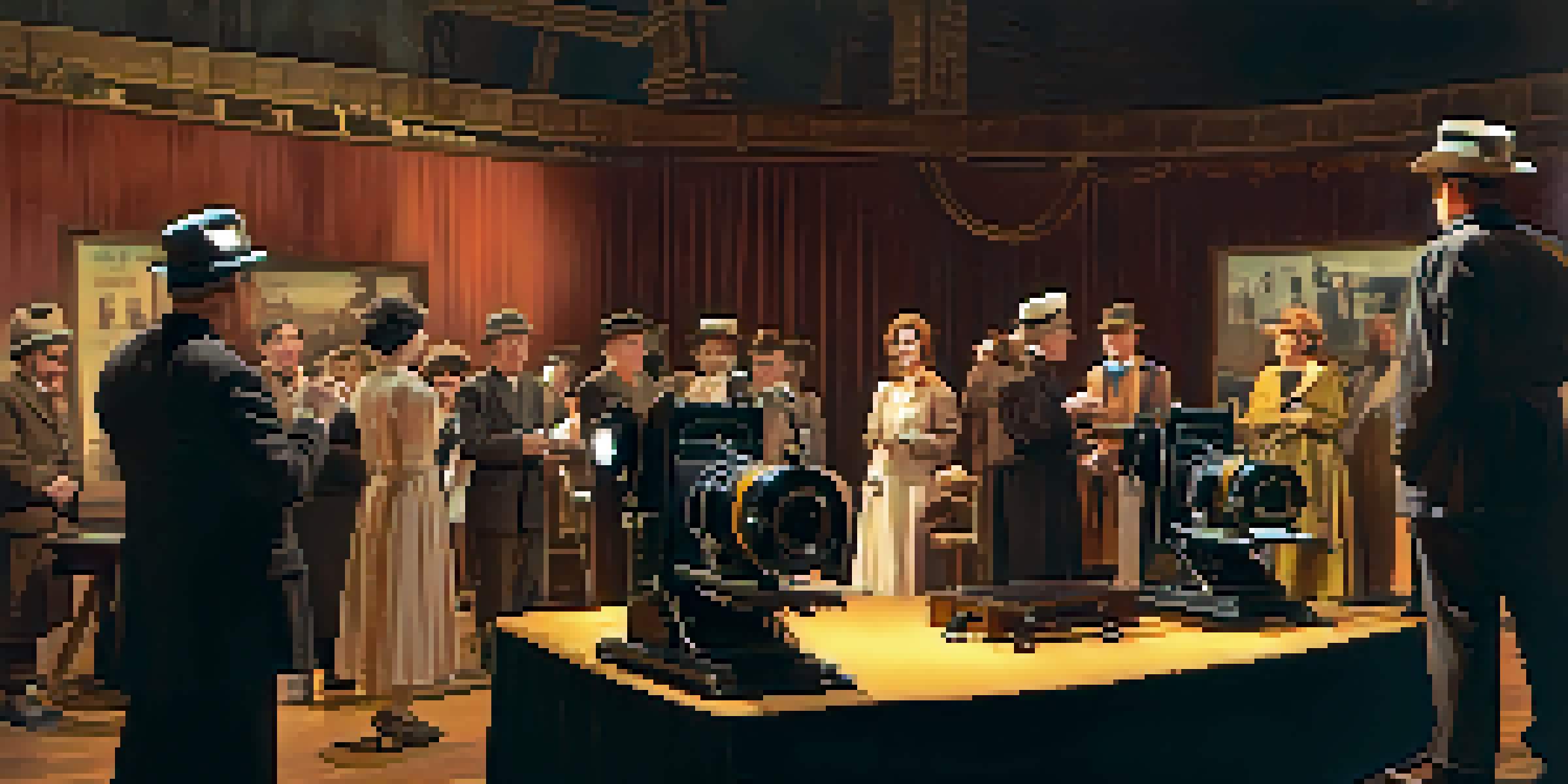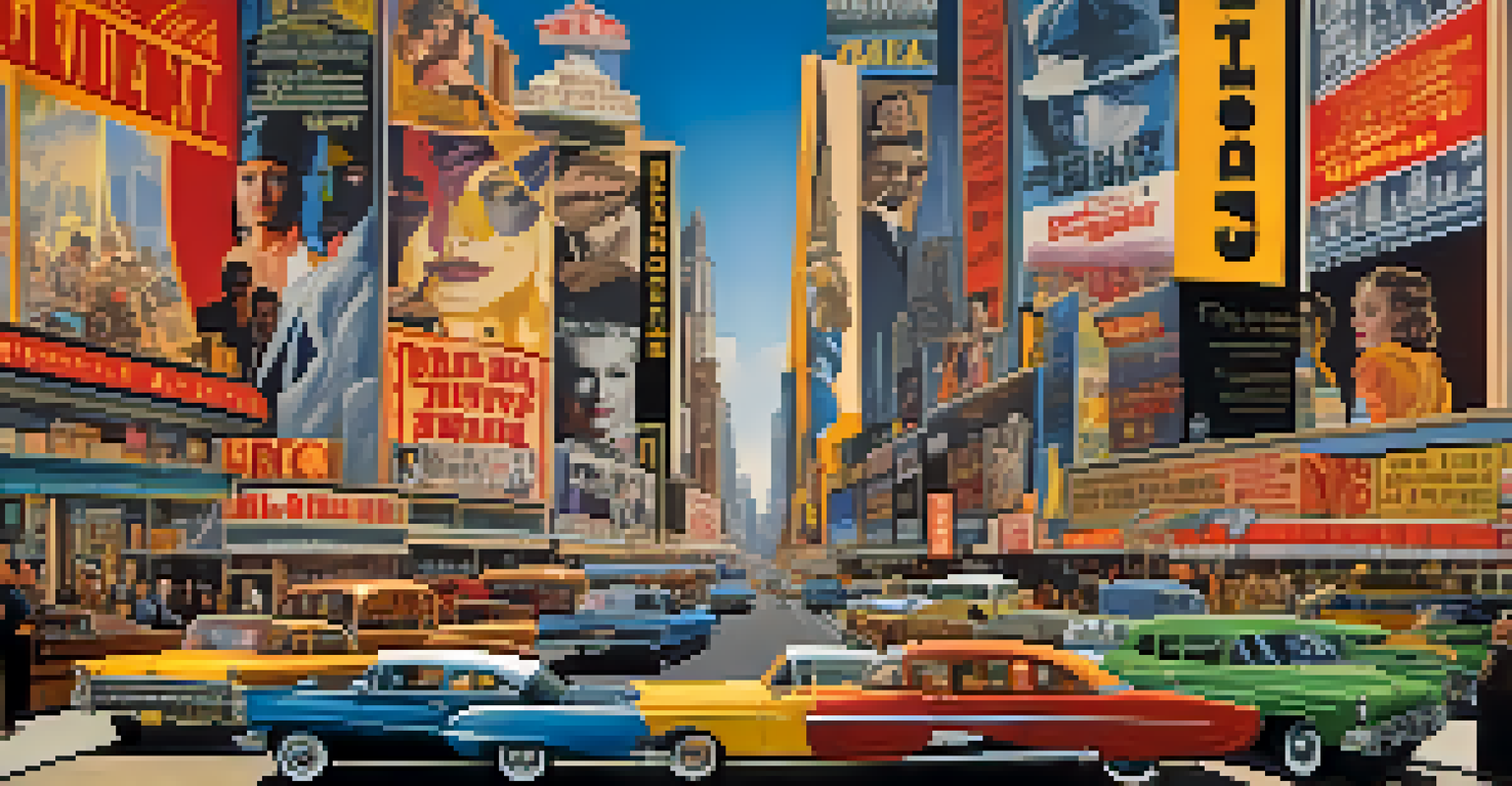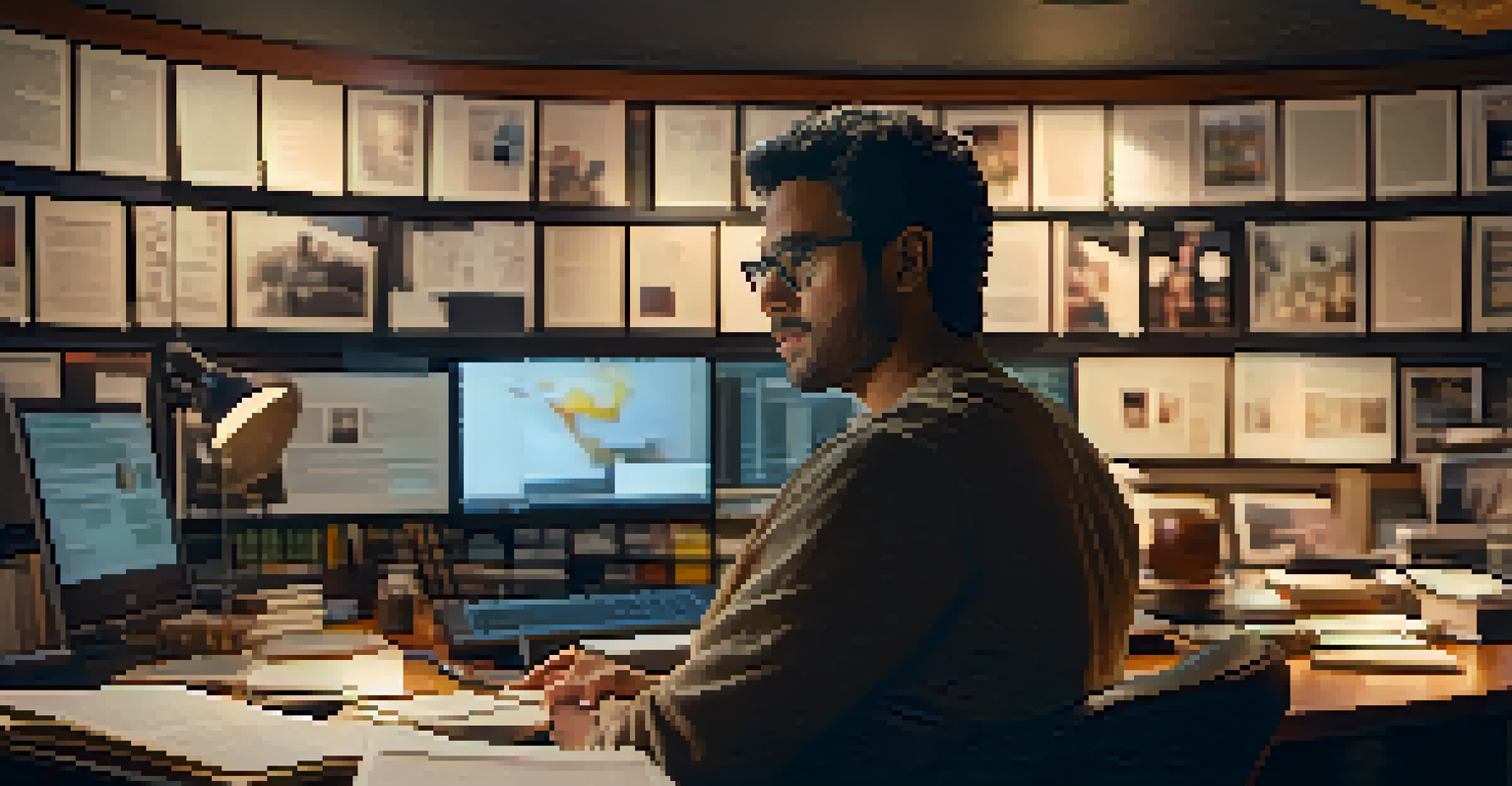The Evolution of Biographical Films: Truth in Storytelling

The Origins of Biographical Films: A Glimpse into History
Biographical films, often called biopics, find their roots in the early 20th century. The genre gained momentum as filmmakers sought to tell the life stories of notable figures, from artists to political leaders. The silent film era introduced audiences to real-life personalities, paving the way for deeper explorations of their lives.
The great thing about biographical films is that they can educate us about our history while also entertaining us with compelling stories.
One of the first successful biographical films was 'The Life of Emile Zola' in 1937, which showcased the life of the French author. This film illustrated how filmmakers could merge historical facts with dramatic storytelling, setting a precedent for future projects. As technology evolved, so did the complexity and depth of the storytelling.
With the introduction of sound and color in films, the biopic genre began to flourish. Directors could now create more immersive experiences, allowing viewers to connect emotionally with the subjects. This evolution marked a significant turning point in how stories were told on screen.
The Golden Age: Biopics as Cultural Commentary
The mid-20th century saw a surge in biographical films, particularly during Hollywood's Golden Age. Productions like 'The Greatest Show on Earth' and 'The Bridge on the River Kwai' not only entertained but also commented on societal issues. These films often depicted larger-than-life characters, showcasing their triumphs and struggles.

During this period, filmmakers began to experiment with narrative structure, intertwining factual events with fictional elements. This blend of reality and imagination allowed for a richer storytelling experience. Audiences were drawn to the human aspects of historical figures, making the stories relatable.
Biopics Blend Fact and Fiction
Biographical films skillfully merge historical accuracy with dramatic storytelling to create engaging narratives.
Moreover, biopics became a platform for exploring themes such as identity, morality, and resilience. By focusing on the personal journeys of their subjects, filmmakers created a space for reflection on broader societal issues. This approach solidified the biopic genre's place in cinematic history.
The Rise of the Modern Biopic: Authenticity Meets Drama
As we moved into the late 20th and early 21st centuries, biographical films began to embrace a more authentic storytelling approach. Filmmakers recognized the importance of accuracy in depicting real events while still crafting a compelling narrative. This shift allowed audiences to engage more deeply with the characters and their stories.
In every biopic, there’s a fine line between fact and fiction, and that’s where the magic happens.
Movies such as 'A Beautiful Mind' and 'The Social Network' exemplify this trend, blending factual history with dramatic interpretation. By focusing on the emotional and psychological complexities of their subjects, these films drew viewers in, making them invested in the characters' journeys. The balance between truth and storytelling became a hallmark of modern biopics.
This era also saw an increase in the representation of diverse voices and lesser-known figures. Filmmakers sought to tell the stories of individuals from various backgrounds, enriching the genre's landscape. This inclusivity highlights the evolving nature of biographical films and their commitment to reflecting society.
The Role of Research: Balancing Fact and Fiction
Research plays a crucial role in the creation of biographical films, as filmmakers strive to present accurate portrayals of their subjects. Extensive research helps ensure that the nuances of a person's life are captured authentically. This process often involves consulting books, interviews, and archival footage to piece together a comprehensive narrative.
However, the challenge lies in balancing factual accuracy with engaging storytelling. Filmmakers must decide which elements of a person's life to emphasize and how to dramatize events without straying too far from the truth. This delicate dance between fact and fiction can lead to criticism or acclaim, depending on the execution.
Research Shapes Authentic Stories
Extensive research is essential for filmmakers to authentically portray the lives of their subjects while balancing entertainment.
Ultimately, the goal is to honor the subject's legacy while providing a captivating viewing experience. The most successful biopics manage to educate audiences while also entertaining them, creating a lasting impact. This ongoing negotiation between truth and storytelling remains a defining characteristic of the genre.
Controversies in Biographical Films: The Fine Line of Truth
Despite their popularity, biographical films often spark debates about the accuracy of their portrayals. Critics argue that filmmakers sometimes take creative liberties that can distort reality, leading to misconceptions about historical figures. For instance, films like 'J. Edgar' and 'The Iron Lady' faced scrutiny for their interpretations of complex lives.
These controversies highlight a crucial question: how much artistic license is acceptable when telling someone's story? Some filmmakers believe that emotional truth can outweigh factual accuracy, while others prioritize strict adherence to the historical record. This debate underscores the inherent tension in the biopic genre.
Ultimately, audiences must navigate this landscape with a discerning eye. Understanding that biographical films are interpretations rather than documentaries can enhance the viewing experience. By recognizing the blend of fact and fiction, viewers can appreciate the artistry involved in storytelling.
Future Trends: The Evolution Continues
As technology advances and storytelling techniques evolve, the future of biographical films looks promising. The rise of streaming platforms has opened new avenues for biopics, allowing for more diverse stories to be told. This accessibility means that audiences can explore a broader range of subjects, from historical figures to contemporary icons.
Moreover, the integration of virtual reality and interactive storytelling may change how we engage with biographical narratives. Imagine stepping into the shoes of a historical figure and experiencing their life events first-hand. This innovative approach could transform our understanding of their journeys and the challenges they faced.
Future of Biopics is Diverse
The evolution of technology and storytelling techniques is paving the way for more inclusive and varied biographical films.
At the same time, the demand for authenticity and representation will continue to shape the genre. Filmmakers will be challenged to balance storytelling with factual integrity, ensuring that diverse voices are heard. As biographical films evolve, they will undoubtedly reflect society's changing values and perspectives.
Conclusion: The Lasting Impact of Biographical Films
Biographical films have come a long way since their inception, evolving into a powerful medium for storytelling. They not only entertain but also educate, providing insight into the lives of remarkable individuals. Through the lens of cinema, audiences gain a deeper appreciation for history and the human experience.
As we continue to explore the balance between truth and storytelling, the genre will adapt to meet contemporary expectations. Filmmakers must navigate the complexities of accuracy, representation, and emotional resonance, striving to create compelling narratives. The journey of biographical films is a testament to the power of storytelling in shaping our understanding of the world.

In the end, biographical films remind us that every life has a story worth telling. As we look to the future, we can anticipate more captivating, diverse, and thought-provoking narratives that inspire and resonate with audiences around the globe.